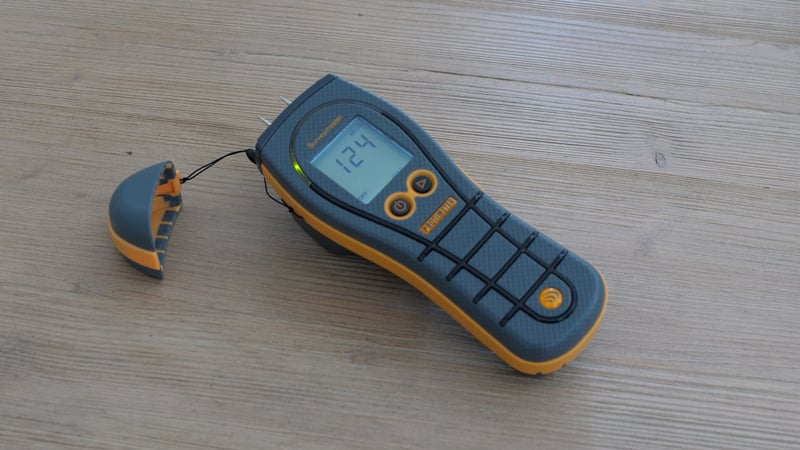
A cast-iron skillet.
A trusty pocket knife.
A home’s vinyl siding.
Your moisture meter?
Some products are built to last as long as you’ll need them. And yes, your professional moisture meter is one of them. We’re still servicing moisture meters our customers purchased in the 1960s.
What does it take to have a meter that goes the distance of your career and is always dependable and accurate?
Like any other item designed for durability, having the best moisture meter for a long time is about investing in quality and some proper care and routine maintenance.
Setting the Stage for a Long Relationship With Your Moisture Meter
A professional moisture meter should represent a big investment.
To put it plainly, if you’re looking for a professional moisture meter that’s long-lasting, you’ll need to pay. Multi-function moisture meters that last for decades typically cost over $1,000.
While that may seem like a hefty price tag, it’s important to keep perspective on a few elements of the purchase:
- Investing in a professional moisture meter from a reputable brand is an expense you’ll only need to make once.
- Conducting a home moisture survey with accurate readings requires a moisture meter that’s reliable and precise. If you’re not confident in your meter’s readings, how can you be confident in your final inspection report?
- Moisture meters that are more wallet-friendly (cheap) are made to be replaced. Purchasing replacement meters over the course of a career adds up -- enough that the initial investment in a premium moisture meter would have been the economical option.
- Using the same meter for many years means you’ll get intimately familiar with its features. You won’t waste time trying to learn new meters.
Best Moisture Meter Practices for Longevity
Professional-grade moisture meters are like any other tool -- they do require a certain level of upkeep and TLC from time to time.
Here are a few do’s and don'ts to help your professional moisture meter go the distance of your career:
DO Protect Your Meter When Not Using It
The last thing anyone wants is to reach for their moisture meter, only to find it’s damaged or broken because something happened when you weren’t using it.
When you’re done taking measurements, put your meter’s cap(s) or cover(s) back on or place it in a protective case. Better yet, do both. This protects the meter from damage when you’re not using it, just like putting your favorite wrench or hammer back in your toolbox.
DON’T Drop Your Meter
This one is similar to telling a quarterback not to fumble the football. It’s going to happen accidentally. And what is an accident if not unintentional?
While most professional moisture meters are durable, their resistance to drops and blunt impacts has limits. In other words, dropping even the most durable meter from a ladder onto a concrete floor will likely damage the device.
DO Keep Your Meter Dry
Though moisture is in its name, that doesn’t mean your meter is immune to the effects of water. Being an electronic device, a moisture meter isn’t meant to function underwater. Even condensation inside your meter can have adverse effects on your device. (Talk about irony.)
Any amount of liquid getting inside a meter’s casing can mean damaged circuitry and modules -- and the end of your meter.
DON’T Expose Your Meter to Extreme Temperatures
Moisture meters are made to operate at room temperature.
Extreme heat damages a meter by warping its electronic components. Frigid temperatures cause other types of damage, such as a cracked LED screen or condensation throughout the device as it warms back up. (Remember what we said about keeping your meter dry?)
One of the worst places you can leave your meter for any length of time is in an unoccupied vehicle. In the summer, cars and trucks get hot quickly. And unless you leave it running with the heat on, your vehicle will prove just as dangerous in the winter to your meter.
DO Replace Worn-Out Components
Over time, a meter’s components do wear out with normal use. In pin-type meters, it’s usually the pins that go first, a component that’s easily replaceable.
Think of replacing your meter’s worn-out components like replacing your car’s old tires.
DON’T Leave the Batteries Installed After Use
Batteries left in a meter too long (several months) sometimes leak -- you’ve probably seen this when you replace batteries in a TV remote.
A battery’s corrosive material can seep into other parts of the device and cause irreparable damage. It’s always a good idea to regularly replace your meter’s batteries.
The Best Moisture Meter: The One You Buy Once
The worst-possible moment for any home inspector is to be on the job and have a tool fail. That costs time and money.
Investing in a dependable moisture meter and taking care of it all but guarantees you’ll have a device that follows you throughout your entire career.
Find the Last Moisture Meter You’ll Ever Purchase
Browse our catalog of professional moisture meters that are designed to stand up to the demands of a long career:
